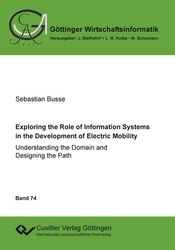| Departments | |
|---|---|
| Book Series (97) |
1381
|
| Nachhaltigkeit |
3
|
| Gesundheitswesen |
1
|
| Humanities |
2369
|
| Medienwissenschaften | 16 |
| Theology | 57 |
| Philosophy | 102 |
| Law | 423 |
| Economics | 851 |
| Social sciences | 417 |
| Sports science | 48 |
| Psychology | 233 |
| Educational science | 190 |
| History | 183 |
| Art | 111 |
| Cultural studies | 166 |
| Literary studies | 117 |
| Linguistics | 88 |
| Natural Sciences |
5408
|
| Engineering |
1795
|
| Common |
98
|
|
Leitlinien Unfallchirurgie
5. Auflage bestellen |
|
Advanced Search
Exploring the Role of Information Systems in the Development of Electric Mobility (Volume 74) (English shop)
Understanding the Domain and Designing the Path
Sebastian Busse (Author)Preview
Table of Contents, PDF (75 KB)
Extract, PDF (180 KB)
This dissertation thesis’ insightful findings combined lead to a promising description of conceptual relationships of Information Systems’ (IS) role in the development of electric mobility. In this regard the challenge of information systems (IS) concerning this application domain is to successfully establish and support a framework or ecosystem that sufficiently connects humans (users) and machines (vehicles and charging infrastructure) in order to enable environmentally sustainable transportation. The dissertation thesis elaborates on what the IS community must achieve and how it should position and structurally align its research by presenting the Interconnected Electric Mobility Framework which serves as an outlook for future research in the domain of IS for sustainable electrified transportation. Thus, this dissertation thesis delivers valuable research from an IS perspective to counteract global climate change, which is one of the most – if not the most – trending and important topics for modern society.
| ISBN-13 (Hard Copy) | 9783954047277 |
| Final Book Format | A5 |
| Language | German |
| Page Number | 200 |
| Edition | 1. Aufl. |
| Book Series | Göttinger Wirtschaftsinformatik |
| Volume | 74 |
| Publication Place | Göttingen |
| Place of Dissertation | Göttingen |
| Publication Date | 2014-06-10 |
| General Categorization | Dissertation |
| Departments |
Economics
Informatics |
| Keywords | Information Systems, Wirtschaftsinformatik, Elektromobilität, electric mobility, electric vehicles |








